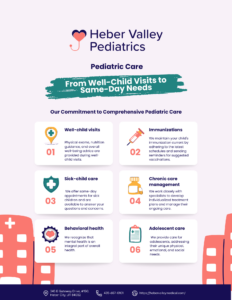Heber Valley Pediatrics is comprised of trusted pediatric specialists dedicated to providing comprehensive care for children from newborn to adolescence. With a team of board-certified pediatricians and a commitment to compassionate, personalized care, Heber Valley Pediatrics ensures that every child receives the attention and support they need to thrive. Pediatric specialists play a crucial role in safeguarding the overall well-being of children, acting as expert guides throughout their developmental journey. This blog aims to shed light on the significance of these specialists, providing easily digestible and informative content that empowers parents with knowledge about their children’s healthcare needs.
What are Pediatric Specialists?
Pediatric specialists are medical doctors who have dedicated their careers to understanding and treating the unique healthcare needs of children. Unlike general practitioners, pediatric specialists possess in-depth knowledge of child development, physiology, and the nuances of pediatric illnesses. They undergo rigorous training, including medical school, pediatric residency, and often additional subspecialty fellowships, gaining expertise in specific areas such as cardiology, neurology, or oncology. This specialized knowledge is crucial for effectively diagnosing, managing, and treating complex pediatric conditions, considering the rapid growth and developmental changes that children experience. Pediatric specialists serve as trusted partners for parents, providing comprehensive care tailored to each child’s individual needs, ensuring their optimal health and well-being throughout their formative years.
When to Consult Pediatric Specialists
Pediatric specialists play a pivotal role in safeguarding the health and well-being of children. While routine checkups with a pediatrician form the foundation of children’s healthcare, there are instances when consulting a specialist becomes essential. Recognizing these situations allows for timely intervention and optimal care.
Common Situations Requiring Specialist Consultation:
- Persistent or Unexplained Symptoms: Persistent or unexplained symptoms, such as fever, rash, vomiting, or recurrent headaches, may indicate an underlying medical condition that requires specialized attention.
- Developmental Concerns: Concerns about a child’s development, such as delayed speech or motor skills, social interaction difficulties, or behavioral challenges, warrant evaluation by a developmental pediatrician.
- Chronic Conditions: Children with chronic conditions, such as asthma, diabetes, or heart disease, benefit from the expertise of pediatric specialists who can provide comprehensive management and ongoing care.
- Specialized Surgeries: Children requiring surgical procedures, whether routine or complex, should be under the care of pediatric surgeons who possess the necessary expertise and experience in performing pediatric surgeries.
Symptoms or Conditions Often Requiring Specialized Care:
- Neurological Disorders: Symptoms such as seizures, migraines, developmental delays, or coordination issues may indicate neurological disorders that require evaluation by a pediatric neurologist.
- Heart Conditions: Congenital heart defects, arrhythmias, or cardiomyopathies necessitate the care of a pediatric cardiologist for specialized diagnosis and treatment.
- Endocrine Disorders: Growth hormone deficiencies, diabetes, thyroid disorders, or other hormonal imbalances require the expertise of a pediatric endocrinologist.
- Childhood Cancers: Suspected or diagnosed childhood cancers demand prompt evaluation and treatment by a pediatric oncologist.
Regular Well-Child Visits:
Regular well-child visits with a pediatrician serve as the cornerstone of preventive healthcare for children. These visits provide opportunities for monitoring growth and development, administering immunizations, detecting potential health issues early, and offering guidance on nutrition, safety, and overall well-being. Pediatricians can also identify potential red flags that may necessitate consultation with a pediatric specialist.
Pediatric specialists play a crucial role in ensuring the optimal health and well-being of children. Recognizing when to consult a specialist is essential for providing timely and effective care, addressing concerns early, and promoting long-term health outcomes. Regular well-child visits with a pediatrician lay the groundwork for preventive care, while open communication between parents and healthcare providers ensures that children receive the specialized attention they need to thrive.
Choosing the Right Pediatric Specialist
Navigating the healthcare landscape can be overwhelming, especially when finding the right pediatric specialist for your child’s unique needs. Here’s a guide to help you make an informed decision:
1. Consider Your Child’s Specific Needs:
Start by understanding the specific reason for seeking a specialist. Are you concerned about a particular condition, developmental delay, or recurring health issue? Identifying your child’s needs will help narrow down your choices.
2. Research Expertise and Experience:
Once you’ve identified the type of specialist needed, delve into their qualifications and experience. Check their board certifications, areas of expertise, and the number of years they’ve been practicing pediatric medicine.
3. Seek Referrals from Your Pediatrician:
Your pediatrician is a valuable resource when choosing a specialist. They can provide insights into your child’s medical history, offer recommendations based on their expertise, and connect you with specialists they trust.
4. Consider Compatibility and Communication Style:
Your child’s comfort and rapport with the specialist are crucial. Attend consultations to assess their communication style, bedside manner, and ability to explain complex medical information in a way your child can understand.
5. Evaluate Practice Location and Availability:
Consider the location of the pediatric specialists practice and their availability for appointments. Ensure it’s convenient for you and your family, and that the specialist’s schedule aligns with your needs.
6. Read Online Reviews and Ask for Recommendations:
Utilize online resources to gather feedback from other parents and healthcare professionals. Seek recommendations from friends, family, or support groups who have had experience with pediatric specialists in your area.
7. Schedule Consultations with Potential Specialists:
Shortlist a few specialists and schedule consultations to get a feel for their personalities, expertise, and approach to care. Discuss your child’s medical history, concerns, and expectations.
8. Make an Informed Decision Based on Your Findings:
After thorough research, consultations, and discussions, make an informed decision based on the factors that matter most to you and your child. Choose a specialist who instills confidence, provides thorough explanations, and demonstrates genuine care for your child’s well-being.
Remember, choosing the right pediatric specialist is a partnership between you, your child, and the healthcare provider. By considering these factors and actively participating in the decision-making process, you can ensure that your child receives the best possible care tailored to their unique needs.
Conclusion
Navigating the world of pediatric healthcare can be both complex and reassuring, especially when seeking the right care for your child. This blog has delved into the significance of pediatric specialists, highlighting their unique expertise and the invaluable role they play in ensuring your child’s optimal health and well-being.
Key Points Revisited:
- Pediatric specialists possess in-depth knowledge of child development, physiology, and the nuances of pediatric illnesses, making them well-equipped to address children’s specific healthcare needs.
- Consulting a pediatric specialist is essential when dealing with persistent or unexplained symptoms, developmental concerns, chronic conditions, or specialized surgical procedures.
- Regular well-child visits with a pediatrician form the foundation of preventive healthcare, providing opportunities for monitoring growth and development, administering immunizations, and detecting potential health issues early.
- Choosing the right pediatric specialist involves considering factors such as experience, expertise, compatibility, practice location, availability, and online reviews.
- Heber Valley Pediatrics stands as a trusted pediatric specialists in Heber City, Utah, offering comprehensive care for children from newborn to adolescence.






1 comment